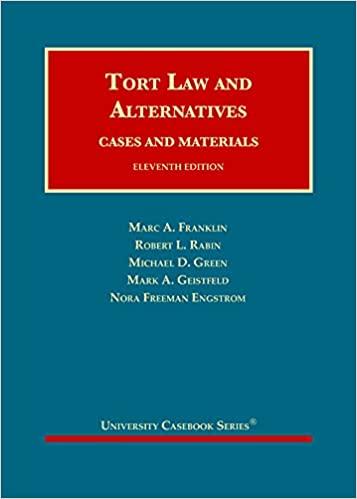Question
The Tenth Amendment to the United States Constitution reserves to the states all powers not granted to the federal government. TrueFalse The United States Constitution
The Tenth Amendment to the United States Constitution reserves to the states all powers not granted to the federal government.
TrueFalse
The United States Constitution is the supreme law of the land.
TrueFalse
In a civil lawsuit, the Defendant is the party being sued.
TrueFalse
A remedy in equity excludes monetary damages.
TrueFalse
Courts never follow a prior precedent.
TrueFalse
Trial state court decisions are, typically, not published.
TrueFalse
The concept of judicial review is not specifically mentioned in the United States Constitution.
TrueFalse
ADR stands for alternative dispute resolution.
TrueFalse
In arbitration, one side wins and one side loses.
TrueFalse
In a business setting, the moral minimum refers to the minimum standard for ethical business behavior.
TrueFalse
The Privileges and Immunities Clause of the United States Constitution prevents a state from imposing unreasonable burdens on citizens of another state.
TrueFalse
The Commerce Clause permits Congress to regulate commerce with foreign nations, among the several states and with Indian Tribes.
TrueFalse
Under the United States Constitution there are no restrictions on a citizen's freedom of speech.
TrueFalse
The United States Constitution does not explicitly mention a general right to privacy.
TrueFalse
The Bills Of Rights were adopted to act as protections for the individual against various types of interference by the federal government.
TrueFalse
A legal citation identifies the publication in which a legal authority can be found.
TrueFalse
It is permissible for certain states to violate the U.S. Constitution.
TrueFalse
Stare Decicisis the practice of deciding new cases with reference to former decisions or precedents.
TrueFalse
Cyber Laws are laws that govern transactions conducted via the internet.
TrueFalse
Punitive damages are those damages to compensate or reimburse a plaintiff for actual losses.
TrueFalse
Statutory Laws are laws enacted by legislative bodies of federal and state governments.
TrueFalse
The three (3) branches of government as established by the U.S. Constitution are the administrative, jurisdictional and procedural branches.
TrueFalse
A remedy is the legal means to enforce a right or redress a wrong.
TrueFalse
In remjurisdiction is the court's jurisdiction over a thing or property.
TrueFalse
Venue refers to the most appropriate location for trial to take place.
TrueFalse
Step by Step Solution
There are 3 Steps involved in it
Step: 1

Get Instant Access to Expert-Tailored Solutions
See step-by-step solutions with expert insights and AI powered tools for academic success
Step: 2

Step: 3

Ace Your Homework with AI
Get the answers you need in no time with our AI-driven, step-by-step assistance
Get Started


